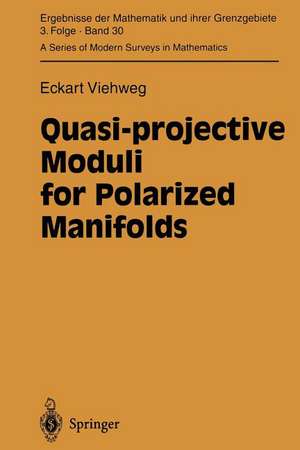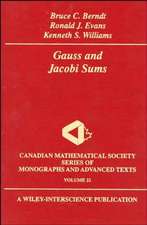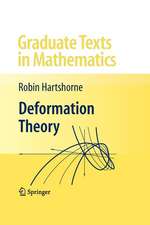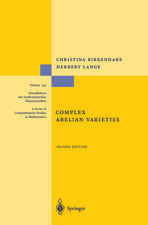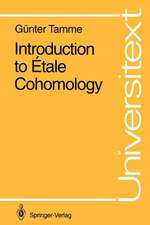Quasi-projective Moduli for Polarized Manifolds: Ergebnisse der Mathematik und ihrer Grenzgebiete. 3. Folge / A Series of Modern Surveys in Mathematics, cartea 30
Autor Eckart Viehwegen Limba Engleză Paperback – 27 dec 2011
Din seria Ergebnisse der Mathematik und ihrer Grenzgebiete. 3. Folge / A Series of Modern Surveys in Mathematics
- 20%
 Preț: 1002.39 lei
Preț: 1002.39 lei - 20%
 Preț: 1029.57 lei
Preț: 1029.57 lei -
 Preț: 367.33 lei
Preț: 367.33 lei -
 Preț: 389.31 lei
Preț: 389.31 lei - 24%
 Preț: 1230.83 lei
Preț: 1230.83 lei - 15%
 Preț: 651.34 lei
Preț: 651.34 lei - 18%
 Preț: 731.28 lei
Preț: 731.28 lei - 18%
 Preț: 783.68 lei
Preț: 783.68 lei - 24%
 Preț: 679.43 lei
Preț: 679.43 lei - 18%
 Preț: 1228.47 lei
Preț: 1228.47 lei - 18%
 Preț: 788.90 lei
Preț: 788.90 lei - 18%
 Preț: 905.36 lei
Preț: 905.36 lei -
 Preț: 388.52 lei
Preț: 388.52 lei -
 Preț: 386.99 lei
Preț: 386.99 lei - 18%
 Preț: 1121.62 lei
Preț: 1121.62 lei - 18%
 Preț: 897.95 lei
Preț: 897.95 lei -
 Preț: 397.38 lei
Preț: 397.38 lei - 18%
 Preț: 911.06 lei
Preț: 911.06 lei - 15%
 Preț: 638.57 lei
Preț: 638.57 lei - 18%
 Preț: 1234.32 lei
Preț: 1234.32 lei - 18%
 Preț: 793.76 lei
Preț: 793.76 lei -
 Preț: 394.12 lei
Preț: 394.12 lei -
 Preț: 491.01 lei
Preț: 491.01 lei -
 Preț: 393.90 lei
Preț: 393.90 lei - 18%
 Preț: 1115.77 lei
Preț: 1115.77 lei - 15%
 Preț: 526.83 lei
Preț: 526.83 lei - 18%
 Preț: 945.79 lei
Preț: 945.79 lei - 18%
 Preț: 1120.99 lei
Preț: 1120.99 lei - 18%
 Preț: 1407.64 lei
Preț: 1407.64 lei - 18%
 Preț: 1243.60 lei
Preț: 1243.60 lei - 18%
 Preț: 804.54 lei
Preț: 804.54 lei - 18%
 Preț: 1115.14 lei
Preț: 1115.14 lei - 15%
 Preț: 700.29 lei
Preț: 700.29 lei - 18%
 Preț: 1116.26 lei
Preț: 1116.26 lei - 15%
 Preț: 655.78 lei
Preț: 655.78 lei
Preț: 782.87 lei
Preț vechi: 954.72 lei
-18% Nou
Puncte Express: 1174
Preț estimativ în valută:
149.80€ • 156.42$ • 123.70£
149.80€ • 156.42$ • 123.70£
Carte tipărită la comandă
Livrare economică 15-29 aprilie
Preluare comenzi: 021 569.72.76
Specificații
ISBN-13: 9783642797477
ISBN-10: 3642797474
Pagini: 332
Ilustrații: VIII, 320 p.
Dimensiuni: 155 x 235 x 17 mm
Greutate: 0.47 kg
Ediția:Softcover reprint of the original 1st ed. 1995
Editura: Springer Berlin, Heidelberg
Colecția Springer
Seria Ergebnisse der Mathematik und ihrer Grenzgebiete. 3. Folge / A Series of Modern Surveys in Mathematics
Locul publicării:Berlin, Heidelberg, Germany
ISBN-10: 3642797474
Pagini: 332
Ilustrații: VIII, 320 p.
Dimensiuni: 155 x 235 x 17 mm
Greutate: 0.47 kg
Ediția:Softcover reprint of the original 1st ed. 1995
Editura: Springer Berlin, Heidelberg
Colecția Springer
Seria Ergebnisse der Mathematik und ihrer Grenzgebiete. 3. Folge / A Series of Modern Surveys in Mathematics
Locul publicării:Berlin, Heidelberg, Germany
Public țintă
ResearchCuprins
Leitfaden.- Classification Theory and Moduli Problems.- Notations and Conventions.- 1 Moduli Problems and Hilbert Schemes.- 1.1 Moduli Functors and Moduli Schemes.- 1.2 Moduli of Manifolds: The Main Results.- 1.3 Properties of Moduli Functors.- 1.4 Moduli Functors for ?-Gorenstein Schemes.- 1.5 A. Grothendieck’s Construction of Hilbert Schemes.- 1.6 Hilbert Schemes of Canonically Polarized Schemes.- 1.7 Hilbert Schemes of Polarized Schemes.- 2 Weakly Positive Sheaves and Vanishing Theorems.- 2.1 Coverings.- 2.2 Numerically Effective Sheaves.- 2.3 Weakly Positive Sheaves.- 2.4 Vanishing Theorems and Base Change.- 2.5 Examples of Weakly Positive Sheaves.- 3 D. Mumford’s Geometric Invariant Theory.- 3.1 Group Actions and Quotients.- 3.2 Linearizations.- 3.3 Stable Points.- 3.4 Properties of Stable Points.- 3.5 Quotients, without Stability Criteria.- 4 Stability and Ampleness Criteria.- 4.1 Compactifications and the Hilbert-Mumford Criterion.- 4.2 Weak Positivity of Line Bundles and Stability.- 4.3 Weak Positivity of Vector Bundles and Stability.- 4.4 Ampleness Criteria.- 5 Auxiliary Results on Locally Free Sheaves and Divisors.- 5.1 O. Gabber’s Extension Theorem.- 5.2 The Construction of Coverings.- 5.3 Singularities of Divisors.- 5.4 Singularities of Divisors in Flat Families.- 5.5 Vanishing Theorems and Base Change, Revisited.- 6 Weak Positivity of Direct Images of Sheaves.- 6.1 Variation of Hodge Structures.- 6.2 Weakly Semistable Reduction.- 6.3 Applications of the Extension Theorem.- 6.4 Powers of Dualizing Sheaves.- 6.5 Polarizations, Twisted by Powers of Dualizing Sheaves.- 7 Geometric Invariant Theory on Hilbert Schemes.- 7.1 Group Actions on Hilbert Schemes.- 7.2 Geometric Quotients and Moduli Schemes.- 7.3 Methods to Construct Quasi-Projective ModuliSchemes.- 7.4 Conditions for the Existence of Moduli Schemes: Case (CP).- 7.5 Conditions for the Existence of Moduli Schemes: Case (DP).- 7.6 Numerical Equivalence.- 8 Allowing Certain Singularities.- 8.1 Canonical and Log-Terminal Singularities.- 8.2 Singularities of Divisors.- 8.3 Deformations of Canonical and Log-Terminal Singularities.- 8.4 Base Change and Positivity.- 8.5 Moduli of Canonically Polarized Varieties.- 8.6 Moduli of Polarized Varieties.- 8.7 Towards Moduli of Canonically Polarized Schemes.- 9 Moduli as Algebraic Spaces.- 9.1 Algebraic Spaces.- 9.2 Quotients by Equivalence Relations.- 9.3 Quotients in the Category of Algebraic Spaces.- 9.4 Construction of Algebraic Moduli Spaces.- 9.5 Ample Line Bundles on Algebraic Moduli Spaces.- 9.6 Proper Algebraic Moduli Spaces for Curves and Surfaces.- References.- Glossary of Notations.
